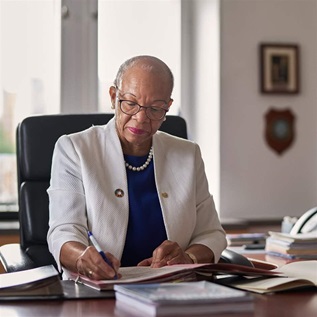The Pew Center for Arts & Heritage Announces 2012 Heritage Philadelphia Program Grant Recipients
The Pew Center for Arts & Heritage has awarded $766,325 through the Heritage Philadelphia Program (HPP) to six local organizations, including two first-time grantees. The 2012 funded projects investigate topical issues such as women's history, disability rights, science and environmentalism, and Muslim heritage. They push beyond conventional boundaries of historic interpretation and preservation, and place a strong emphasis on imaginative outreach to a broad range of audiences.
HPP Director Bill Adair stated, “These projects provide important historical context for highly relevant issues of the present. How can we inspire girls and women to explore the fields of science and medicine? How can Muslim communities be better understood and more empowered to tell their own stories? How can a historic building become a hub and a catalyst for potential visitors and users? These organizations are documenting stories and developing new strategies to connect Philadelphia's dynamic history with its vibrant present.”
The 2012 funded projects include the development of a digital archive of the histories of pioneering women in the medical field; documentaries of the many and diverse Muslim communities of Philadelphia, featuring stories told in their own words; and a community-based plan to revitalize the former home of one of the greatest jazz legends of the 20th century: John Coltrane.
The Legacy Center at Drexel University's College of Medicine, founded in 1850 as the Woman's Medical College of Pennsylvania—the first medical school for women—will develop Playing with the Past: A Digital History Toolkit. This online resource will give students, teachers, and new audiences access to archives formerly seen only by researchers and scholars. These materials tell powerful stories of women who courageously challenged the status quo in the field of medicine. The new toolkit will encourage users to act as “history detectives,” providing unique access to primary documents such as correspondence, oral histories, diaries, and photographs from the past.
Scribe Video Center will produce Muslim Voices of Philadelphia, a collection of documentaries that reflect the diversity of the region's rich Muslim heritage, dating back to the late 19th century, told from first-person perspectives. Participants will commemorate family histories, recount immigration tales, and speak openly about contemporary struggles. In addition to Web-based media and podcasts, Scribe will produce a broadcast-length video documentary on lost Muslim communities of Philadelphia. These works will be presented in multiple local venues and in other cities around the country with large Muslim populations. The project will offer a new look into a community whose size and contributions are not well known, providing outside audiences with a better understanding of the challenges Muslims face in today's world.
The Preservation Alliance of Greater Philadelphia will engage local residents, scholars, musicians, educators, and preservation experts in a collaborative planning process to revitalize the John Coltrane House in North Philadelphia. Coltrane, a legend of 20th-century jazz, lived in the house from 1952 to 1958, during which time he transformed his life and became the influential musician we remember today. The Preservation Alliance will convene a series of focus groups to discuss potential strategies for attracting audiences to the house, and to propose programs that highlight Coltrane's contributions to Philadelphia's cultural heritage. The general public will also be invited to suggest ideas for the usage and maintenance of the property, and to comment on recommendations from the focus groups, through an interactive online forum dedicated to the project.
The 2012 Heritage Philadelphia Program grant recipients also include the Chemical Heritage Foundation, Philadelphia Mural Arts Advocates, and the Temple University Institute on Disabilities. For a list of full project descriptions, please visit www.pcah.us/heritage.
“Audiences will find these projects compelling in what they convey about our region's rich cultural heritage, and also the imaginative ways in which they will be shared,” says Greg Rowe, Director of Culture Initiatives at The Pew Charitable Trusts.
Heritage Philadelphia Program's 2012 grant proposals were evaluated by a panel of experts, recognized for their leadership in the fields of historical interpretation, preservation, and community engagement. The panel is charged with selecting those projects that demonstrate imagination and excellence in public history practice, and which involve exceptional audience-centered programming. For a full list of panelists, advisors, and their credentials, please visit www.pcah.us/heritage.
Established in 1998, the Heritage Philadelphia Program has made a total of 120 grants through this competitive process, investing $10.3 million in meaningful history and heritage projects for audiences in the five-county region of Philadelphia.
The Pew Center for Arts & Heritage is dedicated to stimulating a vibrant cultural community in the five-county, Southeastern Pennsylvania region. Established in 2005, the Center houses seven funding Initiatives of The Pew Charitable Trusts, and through them supports area artists and arts and heritage organizations whose work is distinguished by excellence, imagination, and courage. Each year, the Center's grants make possible more than 800 performances in dance, music, and theater as well as history and visual arts exhibitions, and other public programs for audiences in Philadelphia and its surrounding counties. The Pew Center for Arts & Heritage is funded by The Pew Charitable Trusts and administered by The University of the Arts, Philadelphia. For more information, visit www.pcah.us.











